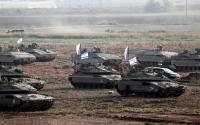The Guardian, 10December, 2001President George Bush has cemented unlikely friendships over the last months. Not even war crimes during Ramadan could shake his partnership with Pakistan's General Pervez Musharraf. Nor could his insistence on pursuing military supremacy in space disrupt his chemistry with the Russian premier, Vladimir Putin. But there can be no less likely partner in his war against terror than Zimbabwe's President Mugabe.
As a leader who constantly rails against the nefarious effects of colonialism, imperialism, racism and international capital on developing countries - often correctly but always cynically - Mugabe would not appear to be a natural cheerleader for US military campaigns. But when it comes to combating terror the US president could have no finer friend. "We agree with President Bush that anyone who in any way finances, harbours or defends terrorists is himself a terrorist," says Jonathan Moyo, Mugabe's mouthpiece. "We, too, will not make any difference between terrorists and their friends and supporters."
Bush's words are reverberating around the world. They are most obviously echoed in Israel. "You in America are in a war against terror," Ariel Sharon said after he left the White House following suicide bombings in Haifa and Jerusalem. "We in Israel are in a war against terror - it's the same war."
They have been repeated by the Indian premier, Atal Bihari Vajpayee. "Both our countries have been familiar with the ugly face of terrorism long before September 11," he said recently in London, referring to violence from Kashmiri secessionists. "We have to go beyond al-Qaida in our war against terrorism and target all sponsors who finance, train, equip and harbour terrorists."
And the words have found currency far closer to home. "What happened in America is the same as that which has been carried out in the UK, and in particular in Northern Ireland," argued David Trimble and Iain Duncan Smith in a joint article two weeks ago. "Osama bin Laden and his followers are no different from those who planned and carried out Omagh, Warrenpoint, Hyde Park, Enniskillen or other atrocities during 30 years of terrorism in Ulster."
Impressively, for a man not known for eloquence or erudition, Bush is about to find an entire, holistic approach to international affairs has been coined in his name. The Bush doctrine is being evoked as a template for conflict resolution worldwide. As Pentagon hawks hover, hunting for more enemies, the Bush doctrine threatens to extend beyond a response to September 11 and become a rule for dealing with the US's global pariahs. Others are finding the rule convenient to appropriate to deal with local difficulties. Relying exclusively on the use of force, the Bush doctrine maxim is: "To every action there should be an unequal and disproportionate reaction."
Its success or failure hinges not on the moral value of its execution nor the long-term consequences of its application but on its ability to produce military results. A considered response does not mean considering a range of responses. It means waiting a few weeks and then doing what you said you would do on day one. According to the Bush doctrine, the war in Afghanistan has been vindicated because it has militarily removed the Taliban. That it has killed hundreds of innocents, exacerbated a humanitarian disaster threatening millions of lives and provoked regional instability by polarising and alienating the Muslim world in a way that will produce a new generation of terrorists is neither here nor there.
The doctrine's logic suggests that the problem with the Vietnam war was not that it sent thousands of young Americans to their deaths in a bid to prevent a poor country choosing an ideological path opposed to US geopolitical interests. The problem was that the Vietnamese won. One of the great benefits of the theory is that it is very simple. Unencumbered by context, causality, proof or persuasion, you need to understand nothing about your enemy but the fact that it must be eliminated. So long as you are convinced of its guilt, you do not need to prove it to anyone else. There should be no negotiation or mediation, no distinction between those who commit acts of political violence and those who support them.
As a response to September 11 some may think this reasonable - the Bush doctrine is defined by military results not political ramifications. But apply it to any other conflict and its faults are immediately apparent. Morph Gerry Adams into Osama bin Laden and west Belfast into Kandahar, carpet bomb, and see what happens to the peace process. Defining a terrorist under the Bush doctrine is entirely dependent on the balance of forces at any time. Those the Americans once financed they now seek to execute. In Zimbabwe, "terrorists" means journalists who question the legitimacy of Mugabe's government. Other "terrorists" include the political opposition challenging Mugabe's desperate rein on power, foreigners opposed to his autocracy and white farmers.
True, Bush cannot be held completely accountable for how others misinterpret his doctrine. But he cannot, at the same time, parade as the leader of the free world, and then accept no responsibility for those who follow him. The problem is not that they are distorting Bush's words but that they are taking them too literally. Nowhere is this more clear than in the Middle East, a gruesome metaphor for what the future holds for the west under the doctrine.
There is Israel - a relatively wealthy, heavily militarised nation, fortified against external and internal opposition - which lives under the continued threat of terrorism. And there is Palestine - a people under illegal occupation with no independent democratic control - living under constant threat of military attack and economic deprivation. Unprotected by international law, unable to negotiate a political settlement and unwilling to be subdued without resistance, Palestinians are forced into ever more desperate and arbitrary acts of violence. Unable to protect itself against attacks and unwilling to seek a political compromise, Israel lashes out with greater military might.
Refusing to distinguish between terrorists and those who support their aims or means, the Israelis undermine moderate voices and create more space for extremists. Refusing to distinguish between Israeli citizens and the Israeli state, Palestinian militants undermine moderate voices in Israel and create space for extremists. For Israel read the west; for Palestine, the south. Military victory informed by political failure and economic imbalance, as the powerful crush and fear the powerless, building higher walls to hide behind the chaos they helped create. The result is less security, less democracy, more bloodshed, more instability for all. When Sharon says that he makes the same war on terror as Bush he speaks more truth than he can ever possibly realise.






